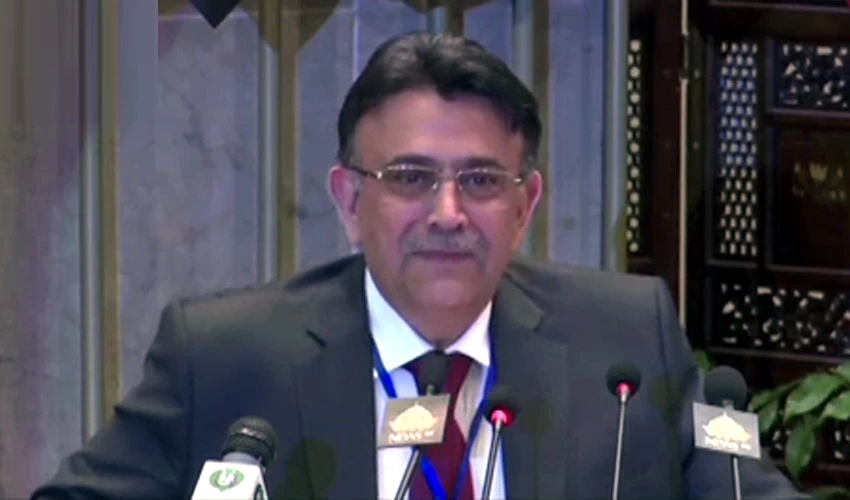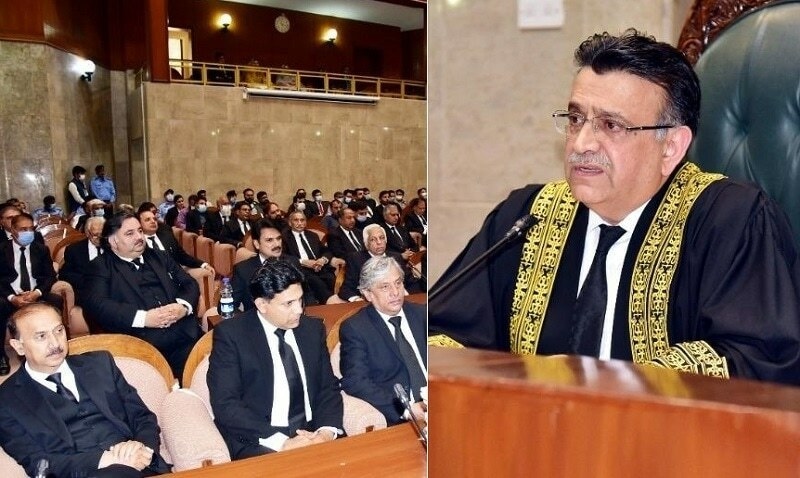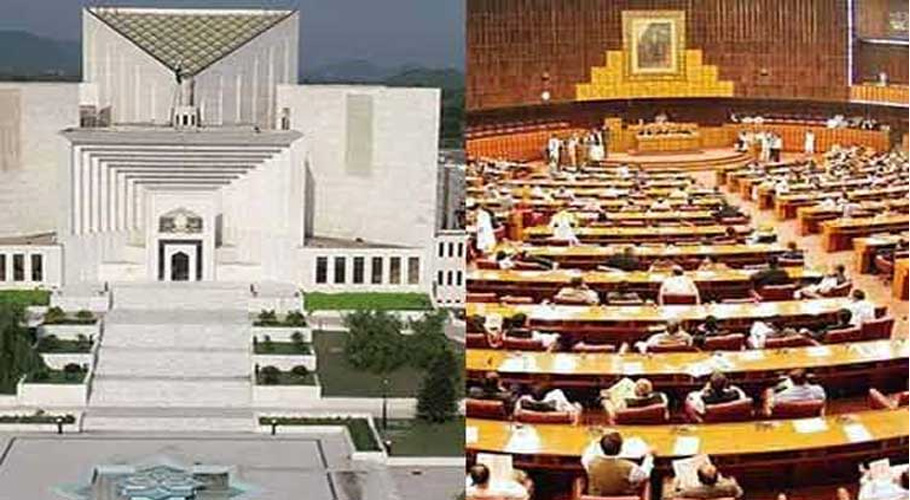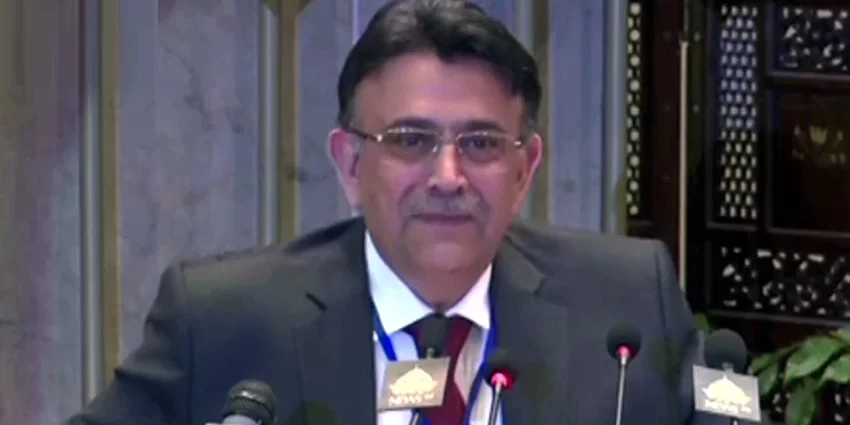
Leaders of Pakistan & political leadership of Pakistan agreed to start negotiations, which have not ended yet: CJP Umar Ata Bandial
Says they have a duty to comply the constitution & we are there to support that effort; otherwise our judgment is there it has a force of its own
Says it may not be implemented today but it will last to the test of time and shall be implemented tomorrow
Says judges of SC could not ‘blink’ their eyes if the Constitution mandated polls within 90 days of an assembly’s dissolution
Says if a review is filed then it will be heard because no judgment is binding unless it becomes final
But if a judgment is not challenged then it becomes final so let see what happens now
Says we have no existence individually, our existence is as a unit
LAHORE ( Web News )
Chief Justice of Pakistan Justice Umar Ata Bandial has said that he was optimistic that the leaders of Pakistan, people of Pakistan and the institutions of Pakistan are all committed to the constitution, do you know that in this context the leaders of Pakistan and political leadership of Pakistan agreed to start negotiations, which have not ended yet, this is what we were informed, we have nothing to do with that, but at least they are conscious that they have a duty to comply the constitution and we are there to support that effort; otherwise our judgment is there it has a force of its own, it may not be implemented today but it will last to the test of time and shall be implemented tomorrow.
Speaking at a conference on minority rights in Lahore on Sunday, Chief Justice Umar Ata Bandial said that we have a duty under the constitution and pursuant to our oath to preserve, to protect and to defend the constitution, this is our abundant duty, the highest law in the country and this duty we perform with utmost commitment and sincerity. Chief justice said that the force of judgments that we give must be in accordance with the constitution and the law and then that is the case our judgments have a moral authority just that the words of The Bible have moral authority, just like the words of the Holy Quran have moral authority, moral authority comes from something which is good, something which is pure, our judgments have the force of moral authority, when they are given in accordance with the constitution and the law of Pakistan.

Chief justice said that I am one of the members of the Supreme Court of Pakistan if you stand up for the constitution and the law then you must support the supreme court of Pakistan and not any individual, we have no existence individually, our existence is as a unit, as a constitutional organ and that is how we function but the important thing is the Supreme Court when it speaks on merit its judgment has moral authority, that becomes more important when those judgments are not appealed or no review is filed then that means no one has any objection to the judgment, if a review is filed then it will be heard because no judgment is binding unless it becomes final but if a judgment is not challenged then it becomes final so let see what happens now.
Chief Justice Umar Ata Bandial said that the judges of the Supreme Court could not “blink” their eyes if the Constitution mandated polls within 90 days of an assembly’s dissolution, adding that it was their duty to say that.
The chief justice said: “When it comes to constitutional enforcement we must not blink our eyes. If it says 90 days for holding elections, it is our duty to say that and not our choice, instead of finding a reason why we should avoid saying that.”
The chief justice said the matter was being called a “controversy”. “I’m sorry, I’m not worthy of controversy, I’m a very humble person. Please don’t say that you support us. I’m just one of the members of the Supreme Court. You must support the Supreme Court if you stand up for the law and the Constitution and not [for] any individual,” he added.

CJP Bandial’s speech also addressed minority rights. He said the Constitution assured freedom to profess religion and to manage religious institutions subject to public order and morality.
“Our Constitution in Article 21 safeguards against the taxation of any particular religion. So for no particular reason can other religions be taxed,” he said. “Article 22 safeguards educational institutions in respect of religion. No religious instruction or ceremony in any educational institution other than one’s own religion.”
The chief justice added that no citizen could be denied admission on the grounds of caste, race, religion, place, or birth to educational institutions which received aid from public revenues.
“Our Constitution says everyone is free to profess their religion, and all citizens have equal rights and yet for years our minorities have felt discriminated, marginalised and sidelined.
“In 2014, SC under CJP Tasaduq Hussain Jillani took up this challenge and came up with directions to protect the rights of minorities. Directions about curriculum, to ensure there is no hate speech against religions, establishing taskforce and special police force to protect places of worship, education quota in institutions were given.”
CJP Bandial highlighted how for many years these directions were carried out by former police officer Shoaib Suddle, a court appointee.
“Today the minorities see that judgment as an umbrella for their rights,” he said, shedding light on how incidents of violence against minorities over sectarianism had also diminished.
CJP Bandial made it clear that Islam did not appreciate sectarianism as he cited a few Quranic verses out of the several that talk about it.
“It is said to leave these differences to God, What you have to do is do good deeds, and for others who do bad deeds, just inform them to not do it. Just advise. You don’t have to be violent or aggressive.”
The chief justice highlighted how the Holy Quran stated that there was no compulsion in religion and it was a person’s own will and wish.
“In another chapter, it is said do not denigrate the deeds of other faiths. Let them do their religious deeds,” he said, adding that in another chapter, “it is said that due to the intervention of Allah for the protection of worship places of other faiths, the people who were fighting and confronting did not destroy the religious place because Allah intervened to protect them. This is the right of worshippers.”
During the seminar titled “Rights for minorities in constitution of Pakistan,” the chief justice spoke about the importance of upholding the constitution and protecting the rights of minorities.
He praised the contributions of Justice AR Cornelius, a former judge of the Supreme Court, who he said was a good jurist and simplistic.
Chief Justice Bandial also spoke about the ongoing Punjab election case, stating that the court was not looking for excuses and was committed to following the constitution. He emphasised that if a judicial decision was not challenged, it would be considered final.
Turning his attention to Pakistan’s ongoing struggle with terrorism, the chief justice noted that the country had lost more than 80,000 lives in the war against terrorism.
He stressed that every citizen had basic rights that must be protected, and it was the right of the Supreme Court to ensure that those rights were upheld.
The chief justice also spoke about the need for judges to have the qualities of Justice Cornelius in order to ensure justice was done. He added that the decisions of courts have moral authority and that protecting the constitution was one of the judiciary’s basic duties.
Justice Cornelius was known for his landmark decisions, including declaring the dissolution of assemblies by the governor-general as illegal in 1955. He also played a key role in lifting the ban on the Jamaat-e-Islami (JI) in 1964.
Chief Justice Bandial emphasised the importance of resolving issues through dialogue and promoting knowledge as a means of developing the country. He reiterated that everyone was subject to the law, and when the truth was avoided, justice was avoided.
Concluding his speech, CJP Bandial said: “The implementation bench is always there so file an application and let’s see what happens.”

